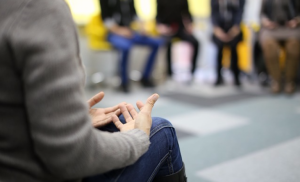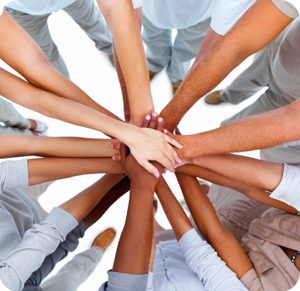Group Therapy
Each of us has been raised in group environments, either in our families, schools, organised activities or work. These are the environments in which we grow and develop as human beings. Group therapy is no different. It provides a place where you come together with others to share problems or concerns, to better understand your own situation, and to learn from and with each other.

In the same way as individual therapy is intended to help people who would like to improve on their ability to cope with difficulties and problems in their lives, group therapy has the same goals. But, while in individual therapy the client meets with only one person (the therapist), in group therapy the meeting is with a whole group and one or two therapists. Group therapy focuses on interpersonal interactions so relationship problems are best addressed in groups.
The aim of group therapy is to help with solving emotional difficulties and to encourage personal development . Members gain insight into their own thoughts and behaviours and offer suggestions and support to each other.
In studies comparing group therapy to individual therapy, group therapy has been shown to be as effective and sometimes even more effective in meeting individual client objectives. In cases of medical illness, there is substantial evidence that this form of therapy helps people cope better with their illness and enhances the quality of their lives.
Groups meet weekly at both our Fulham and City sites.
Some common concerns and questions are as follows:
Who can benefit from group therapy?
Group therapy is suitable for a large variety of problems and difficulties. Some people want to develop their interpersonal skills and some clients may have emotional problems like anxiety, depression, etc. For that reason in building the group, the leader will try to include men and women, young and old people, married and singles, etc. The group is especially effective for people with interpersonal difficulties. Whether these difficulties are in social, working, couple or even sexual relations. Groups are ideally suited to people who are struggling with relationship issues like intimacy, trust, self-esteem. The group interactions help you to identify, get feedback, and change the patterns that are sabotaging your relationships. The great advantage of group therapy is working on these patterns in the “here and now” – in a group situation more similar to reality and close to the interpersonal events.
What are the benefits of group therapy?

People who participate in therapy groups can benefit in the following ways:
- give and receive support
- gain understanding of problems and explore possible solutions
- practice interpersonal skills in a safe group setting
- learn more about how you come across to others
- increase observation and feedback skills
- enhance problem-solving skills
- improve emotional expressiveness
- decrease social isolation
- develop good communication skills
How does group therapy work?
Group members share personal issues which they are facing. You can talk about events you were involved in during the week, your responses to these events, problems you tackled, etc. you can share your feelings and thoughts about what happened in previous sessions, and talk about issues raised by other members or comments from the group leaders. Other members can share their responses to you, give you feedback, encouragement, support.
The subjects for discussion are not determined by the leader but rise spontaneously from the group. You begin to feel less alone with your problem and that there are others who feel the same. The group can become a source of support and strength in times of stress. The feedback received from others about your behaviour in the group creates awareness of maladaptive patterns of behaviour, which would help you to adopt more constructive and effective reactions. It can become a forum for practicing new behaviours.
Frequently the people you meet in the group represent others in your past or current life with whom you have difficulties. In group therapy you have the opportunity to work through these situations. These skills are transferable to other relationships.
Why attend group therapy?
Most personal problems are interpersonal in nature. Very often they stem from our relationships or from our personal patterns of relating. Group therapy offers the rare opportunity to explore and understand how you relate to others and get specific feedback on how others react to you. Groups can be more effective and produce quicker results than individual counselling. The lessons group members learn from each other and the chance to work through problems with other people who share similar concerns, are what make groups special. Only in group therapy can you directly work on how you relate to others. The group environment of trust and safety can help you build the skills you need to create the same kind of trust and safety in your “real life” i.e with work colleagues, family, friends,and intimate partners.
The group experience can help you learn about your style of relating, your ability to be close, and your personal effectiveness in relationships, and gives you the unique chance to see how others struggle with these concerns. It also offers the opportunity to explore a broad range of personal concerns.
Isn’t individual therapy better?
That’s one of the common misunderstandings about group therapy: “Group therapy will take longer than individual therapy, because I will have to share the time with others.”
Group therapy can be more efficient than individual therapy for two reasons. First, you can benefit from the group even during sessions when you say little by listening carefully to others. You will find that you have much in common with other group members, and as they work on a concern, you can learn more about yourself. Second, group members will often bring up issues that strike a chord with you, but which you might not have been aware of or brought up yourself.
Will I be forced to tell all of my deepest thoughts, feelings and secrets to the group?
No one will force you to do anything in group therapy. You control what, how much and when you share with the group. You do not have to share what you are not ready to disclose.
I have so much trouble talking to people, will I ever be able to share in a group?
Most people are anxious about being able to talk in group. Almost without exception, within a few sessions people find that they do begin to talk in the group. Group members remember what it is like to be new to the group, so you will get a lot of support for beginning to talk in the group.
Will there be people with similar problems in my group?
The therapist’s role is to evaluate each member’s problems prior to forming the group. Usually there is a mix of members who can learn from each other. While some members will have similar circumstances, it’s not necessary for all to be dealing with exactly the same problem. In fact, people with different strengths and difficulties are often in the best position to help one another.
What do I ask the group therapist?
When talking with therapists, here are four simple questions you may want to ask.
- What is your background?
- Given my specific situation, how do you think group would work for me?
- What are your credentials as a group therapist?
- Do you have special training that is relevant to my problem?
Contact us for further information.
